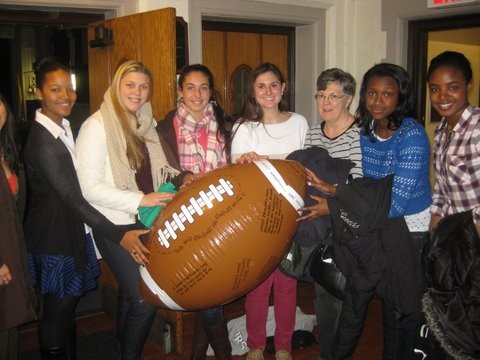High schoolers focus on keeping women safe
Sacred Heart students raise awareness of human trafficking
While most of the nation will be gearing up for the Super Bowl in February, which will take place at MetLife Stadium in New Jersey, by planning parties, six young women at Sacred Heart Academy will be drawing attention to a less renowned ritual at the event: the hiring of prostitutes.
Sacred Heart seniors Samantha Levano, 16, Nicole Cody, 16, Mia Campbell, 17, and juniors Olayemi Akingboye, 16, Sarah Tanchuck, 16, and Cassidy Pinder, 16, have recently launched a school campaign to raise awareness about human trafficking after attending a student summit on the growing prostitution problem at the Super Bowl titled Not on Our Turf: Students for a Traffick Free Super Bowl, at St. Mary Louis Academy in Queens on Nov. 16. The event was hosted by Project Stay Gold, a global nonprofit organization dedicated to educating students about modern-day slavery and mounting a worldwide abolitionist movement.
“I think we really have to spread [this message], especially in these schools, because no one is really talking about it, and that’s the big issue,” Levano said. “If no one talks about it, these women who are vulnerable and who come from homes where they’re being abused, or maybe their family isn’t really all together, it will make them more likely to fall into this horrible system.”
At the summit, the Sacred Heart students took part in workshops and discussions, led by speakers from the U.S. Department of Homeland Security and the New York City Police Department Special Victims Squad, that focused on the facts about sex slavery while encouraging students to launch their own social awareness campaign at their schools.
Students learned that a slave during the Civil War era cost about $40,000 in today’s currency, while sex workers today are worth around $90.
“People are basically feeding off of other people’s vulnerabilities for their own gain, and I feel as though society is sort of responsible in a way,” Pinder, who is from West Hempstead, said of sex trafficking. “I feel like people who do things like this, who traffic others, have lost a part of their humanity, and I feel as though society should have it ingrained in others that we should take responsibility for each other.”
Before the girls attended the Not On Our Turf summit, Levano and Cody were drawn to the subject after reading the 2009 book “Half the Sky: Turning Oppression into Opportunity for Women Worldwide,” by Nicholas D. Kristof and Sheryl WuDunn, which explored the subject of sex slavery, along with other human rights violations, for their Gender Studies class, taught by Sacred Heart English teacher Mary Ellen Minogue.
Minogue — who assigned the reading as a way to promote the mission of unity, reconciliation, inclusive love, peace and justice — said these young women are “the lived example of how to put those [principles] into practice” by not only forming a sense of sisterhood among one another, but by helping to raise consciousness about women’s rights for those who often face the reality of sex slavery overseas.
“To see that spark is so important, that sense of responsibility to others,” Minogue said of her students. “I think all of them just got a sense of how lucky we are in our situation here that we are not intimately involved with such a horrendous crime.”
Akingboye, who emigrated to Hempstead from Nigeria in the early 2000s, said that young girls in her native country are often tricked into sex slavery when traffickers promise them a new life in the U.S. “We all have worth, God sees that, and all of humanity, as well, needs to see that we’re equal,” she said. “We all need to work together to become one and to see the worth in each other.”
In mounting their social awareness campaign, with the help of Sacred Heart’s campus minister, Veronica Ticas, the girls plan to hang informational posters around the school and spread the word among students, administrators and organizations. Campbell is writing an article about their project for The Cordette, Sacred Heart’s student newspaper.
They also hope to reach out to male counterparts at several all-boys parochial schools, specifically Chaminade High School, and local middle schools to educate younger students, because the average age of female slaves, Tanchuck said, ranges from 12 to 14.
“We can’t shelter our younger siblings or cousins — we can’t shelter them from the problems that exist in the world,” Tanchuck said, “because we don’t want them to deal with these issues at young ages, but we want them to know that the problem exists.”
Aside from educating others about human trafficking, the girls have begun organizing a candlelight vigil, which they hope will take place early next year, in memory of women around the world who have suffered sexual oppression.
“Most of the women who are suffering or perishing from these human rights issues need to be honored for their dignity,” said Levano. “We need to show them that they are loved and they are loved by us as their fellow sisters.”
Comments on this story? Ewebb@liherald.com.

 44.0°,
Mostly Cloudy
44.0°,
Mostly Cloudy 




